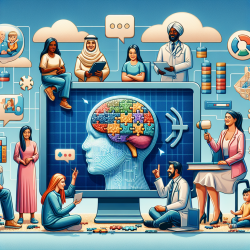Introduction to Global Mental Health
In the rapidly evolving field of global mental health (GMH), practitioners are tasked with addressing the mental health needs of diverse populations. The recent research article "Global Mental Health: Where We Are and Where We Are Going" provides critical insights into the current state and future directions of GMH. This blog will explore how practitioners can leverage these findings to enhance their skills and improve outcomes for children.
Key Findings from the Research
The research highlights several domains that are crucial for understanding and improving global mental health:
- Socioeconomic Determinants: Mental health is deeply intertwined with socioeconomic factors, which disproportionately affect vulnerable populations.
- Inequities in Treatment: There is a significant gap in mental health treatment coverage globally, with low access in low- and middle-income countries (LMICs).
- Integration and Task-Shifting: Integrating mental health care into primary care and adopting task-shifting strategies are promising approaches but face implementation challenges.
- Inclusion of Lived Experiences: Increasing efforts are being made to include individuals with lived experiences in research and policy-making.
Implementing Research Outcomes in Practice
Practitioners can enhance their skills by implementing the following strategies based on the research findings:
- Focus on Socioeconomic Factors: Understand and address the socioeconomic determinants of mental health in your practice. This can involve advocating for policies that reduce poverty and discrimination, which are significant contributors to mental health issues.
- Improve Treatment Access: Work towards increasing access to mental health services in underserved areas. This may involve collaborating with community organizations to provide services in non-traditional settings.
- Adopt Integrated Care Models: Implement integrated care models that bring mental health services into primary care settings. This approach can reduce stigma and improve access to care.
- Engage Individuals with Lived Experiences: Include individuals with lived experiences in the development and evaluation of mental health programs. Their insights can lead to more effective and culturally sensitive interventions.
Encouraging Further Research
While the current research provides valuable insights, there is a need for further exploration, particularly in the following areas:
- Localized Research in LMICs: More research is needed in LMICs to understand the unique challenges and opportunities in these regions.
- Longitudinal Studies: Conduct longitudinal studies to better understand the long-term impacts of socioeconomic determinants on mental health.
- Innovative Care Models: Explore and evaluate innovative care models, such as digital interventions, that can increase access to mental health services.
To read the original research paper, please follow this link: Global Mental Health: Where We Are and Where We Are Going.










